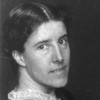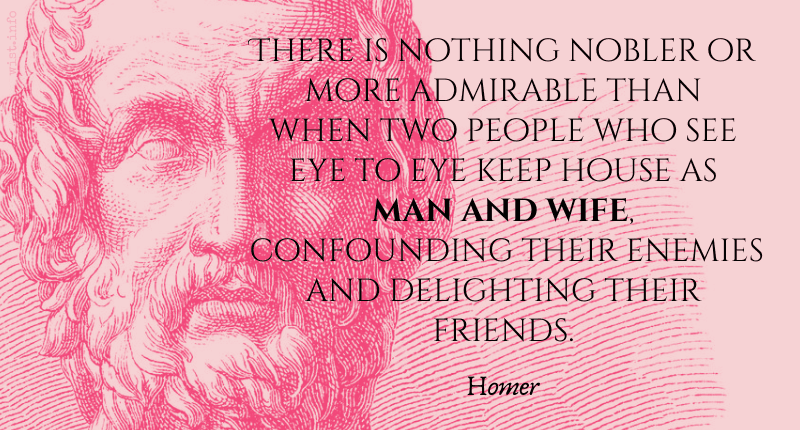Polygamy may well be held in dread,
Not only as a sin, but as a bore:
Most wise men, with one moderate woman wed,
Will scarcely find philosophy for more.
Quotations about:
marriage
Note not all quotations have been tagged, so Search may find additional quotes on this topic.
I have always believed that the key to a happy marriage was the ability to say with a straight face, “Why, I don’t know what you’re worrying about. I thought you were very funny last night, and I’m sure everybody else did, too.”
Judith Martin (b. 1938) American author, journalist, etiquette expert [a.k.a. Miss Manners]
Common Courtesy, “Those Who Would Change the Country’s Manners Encounter Citizen Resistance” (1985)
(Source)
A little House well fill’d, a little Field well till’d, and a little Wife well will’d, are great Riches.
Benjamin Franklin (1706-1790) American statesman, scientist, philosopher, aphorist
Poor Richard (1735 ed.)
(Source)
No speed of wind or water rushing by
But you have a speed far greater. You can climb
Back up a stream of radiance to the sky,
And back through history up the stream of time.
And you were given this swiftness, not for haste
Nor chiefly that you may go where you will.
But in the rush of everything to waste,
That you may have the power of standing still—
Off any still or moving thing you say.
Two such as you with a master speed
Cannot be parted nor be swept away
From one another once you are agreed
That life is only life forevermore
Together wing to wing and oar to oar.Robert Frost (1874-1963) American poet
“The Master Speed” (1934)
(Source)
Collected in A Further Range (1937). Frost wrote the poem for his daughter's wedding, and the final line is the epitaph on his wife's portion of their gravestone.
At every party there are two kinds of people — those who want to go home and those who don’t. The trouble is, they are usually married to each other.
Ann Landers (1918-2002) American advice columnist [pseud. for Eppie Lederer]
“Ask Ann Landers,” syndicated column (1991-06-19)
(Source)
Where a source for this is cited, it is at the above date and in International Herald Tribune, presumably as part of her syndicated column. The quotation is included in a rotating sidebar element at Landers' website, but cannot be found in search on the site.
You mean, apart from my own?
Zsa Zsa Gabor (1917-2016) Hungarian-American actress, socialite [b. Sári Gábor]
(Attributed)
When asked by an interviewer how many husbands she had had.
Widely attributed to Gabor. The earliest reference I can find is in Kenneth Edwards, I Wish I’d Said That! (1976).
Husbands are like fires. They go out when unattended.
Zsa Zsa Gabor (1917-2016) Hungarian-American actress, socialite [b. Sári Gábor]
Quoted in Newsweek (1960-03-28)
(Source)
It is bad when a married pair bore each other, but far worse when only one of them bores the other.
[Es ist schlimm, wenn zwei Eheleute einander langweilen, viel schlimmer jedoch ist es, wenn nur Einer von ihnen den Andern langweilt.]
Marie von Ebner-Eschenbach (1830-1916) Austrian writer
Aphorisms [Aphorismen], No. 283 (1880) [tr. Wister (1883)]
(Source)
(Source (German)). Alternate translation:
It's bad enough when married people bore one another; but it's far worse when only one of them bores the other.
[tr. Scrase/Mieder (1994)]
PRINCE: In time the savage bull doth bear the yoke.
BENEDICK The savage bull may, but if ever the sensible Benedick bear it, pluck off the bull’s horns and set them in my forehead, and let me be vilely painted, and in such great letters as they write “Here is good horse to hire” let them signify under my sign “Here you may see Benedick the married man.”
William Shakespeare (1564-1616) English dramatist and poet
Much Ado About Nothing, Act 1, sc. 1, l. 256ff (1.1.256-262) (1598)
(Source)
Wedlock, as old Men note, hath likened been,
Unto a publick Crowd or common Rout;
Where those that are without would fain get in,
And those that are within would fain get out.
“If Mr. Darcy is neither by honour nor inclination confined to his cousin, why is not he to make another choice? And if I am that choice, why may not I accept him?”
“Because honour, decorum, prudence, nay, interest, forbid it. Yes, Miss Bennet, interest; for do not expect to be noticed by his family or friends, if you wilfully act against the inclinations of all. You will be censured, slighted, and despised, by everyone connected with him. Your alliance will be a disgrace; your name will never even be mentioned by any of us.”
“These are heavy misfortunes,” replied Elizabeth. “But the wife of Mr. Darcy must have such extraordinary sources of happiness necessarily attached to her situation, that she could, upon the whole, have no cause to repine.”Jane Austen (1775-1817) English author
Pride and Prejudice, ch. 56 [Elizabeth and Lady Catherine] (1813)
(Source)
Being unable to abolish Love, the Church has desired at least to disinfect it, and has invented marriage.
[Ne pouvant supprimer l’amour, l’Église a voulu au moins le désinfecter, et elle a fait le mariage.]
Charles Baudelaire (1821-1867) French poet, essayist, art critic
Journaux Intimes [Intimate Journals], “Mon cœur mis à nu [My Heart Laid Bare],” § 52 (1864–1867; pub. 1887) [tr. Isherwood (1930)]
(Source)
(Source (French)). Alternate translations:
Unable to eliminate love, the Church at least wanted to disinfect it -- and hence created marriage.
[tr. Sieburth (2022)]
Unable to do away with love, the Church found a way to decontaminate it by creating marriage.
[Source]
Unable to suppress love, the Church wanted at least to disinfect it, and it created marriage.
[Source]
Mature people relate to each other without the need to merge.
It is a truth universally acknowledged, that a single man in possession of a good fortune, must be in want of a wife. However little known the feelings or views of such a man may be on his first entering a neighbourhood, this truth is so well fixed in the minds of the surrounding families, that he is considered the rightful property of some one or other of their daughters.
Some marriages break up, and some do not, and in our world you can usually explain the former better than the latter.
Mignon McLaughlin (1913-1983) American journalist and author
The Second Neurotic’s Notebook, ch. 1 (1966)
(Source)
After a hard night of it two old friends fell into a sleepy conversation in the steam-room of a Turkish bath.
“My wife loves me so much,” said one, “that she’ll believe me when I tell her I was kept downtown all night by business.”
“My wife loves me so much,” said the other, “that I won’t be afraid to tell her the truth.”H. L. Mencken (1880-1956) American writer and journalist [Henry Lewis Mencken]
A Little Book in C Major, ch. 1, § 10 (1916)
(Source)
You lead such matching, equal lives —
the worst of husband, worst of wives —
that it’s a mystery to me
why you aren’t suited perfectly.[Cum sitis similes paresque vita,
Uxor pessima, pessimus maritus,
Miror, non bene convenire vobis.]Martial (AD c.39-c.103) Spanish Roman poet, satirist, epigrammatist [Marcus Valerius Martialis]
Epigrams [Epigrammata], Book 8, epigram 35 (8.35) (AD 94) [tr. McLean (2014)]
(Source)
(Source (Latin)). Alternate translations:
When as you are so like in life,
A wicked husband, wicked wife,
I wonder you should live in strife.
[16th C Manuscript]
Sith that you both are like in life,
(a naughty man, an wicked wife:)
I muse ye live not voyd of strife.
[tr. Kendall (1577), "To a Married Couple, that could not Agree"]
Why doe your wife and you so ill agree,
Since you in manners so well matched be?
Thou brazen-fac'd, she impudently bould,
Thou still dost brawle, she evermoure doth scould.
Thou seldome sober art, she often drunk,
Thou a whore hunting knave, she a knowne Punck.
Both of you filch, both seare, and damme, and lie,
And both take pawnes, and Iewish usurie.
Not manners like make man and wife agree,
Their manners must both like and vertuous bee.
[tr. Davison (1602)]
Both man and wife as bad as bad can be:
I wonder they no better should agree.
[tr. Hay (1755)]
O peerless pair, so like in life,
O vilest husband, vilest wife!
No wonder ye agree -- in strife.
[tr. Elphinston (1782), "To a Married Pair," Book 6, Part 2, ep. 46]
Alike in temper and in life,
A drunken husband, sottish wife,
She a scold, a bully he, --
The devil's in 't they don't agree.
[tr. Hoadley (fl. 18th C), §243]
Since you are so well matched, and so much alike in your lives, a very bad wife, and a very bad husband, I wonder that you do not agree.
[tr. Bohn's Classical (1859), "To a Bad Couple"]
You are so like, so equal, in your life,
A husband of the worst, a worthless wife,
I really wonder why you don't agree.
[ed. Harbottle (1897)]
Seeing that you are like one another, and a pair in your habits, vilest of wives, vilest of husbands, I wonder you don't agree!
[tr. Ker (1919)]
It is very strange, as it seems to me,
That you and your wife should not agree,
Since each is as vile as vile can be.
[tr. Pott & Wright (1921), "Depth to Depth"]
Bad wife, bad husband, like as pea to pea,
I really wonder that you can't agree.
[tr. Francis & Tatum (1924), ep. 412]
Since you're alike and lead a matching life,
Horrible husband and ill-natured wife,
Why all the discord and domestic strife?
[tr. Michie (1972)]
Since the two of you are alike and equal in your way of life, a rotten wife and a rotten husband, I am surprised you don't suit one another.
[tr. Shackleton Bailey (1993)]
You're an awful couple,
but birds of a feather --
It's weird you don't
Get along together.
[tr. Ericsson (1995)]
How can your squabbling be so curst?
Of natural pairings yours is first --
Worst husband with a wife that's worst.
[tr. Wills (2007)]
Since you two are similar and equal in your way of life, being an awful wife and an awful husband, I’m surprised you don’t get along well with each other.
[tr. aleator classicus (2012)]
Since you both share the same approach to life
(a lousy husband and a lousy wife),
I am bewildered it
is not a better fit.
[tr. Juster (2016)]
Love is more pleasant than marriage for the same reason that novels are more amusing than history.
[L’amour plaît plus que le mariage, par la raison que les romans sont plus amusants que l’histoire.]
Nicolas Chamfort (1741-1794) French writer, epigrammist (b. Nicolas-Sébastien Roch)
Products of Perfected Civilization [Produits de la Civilisation Perfectionée], Part 1 “Maxims and Thoughts [Maximes et Pensées],” ch. 6, ¶ 391 (1795) [tr. Merwin (1969)]
(Source)
(Source (French)). Alternate translations:
Love gives greater pleasure than marriage for the same reason that romances are more amusing than history.
[tr. Hutchinson (1902), "The Cynic's Breviary"]
Love is a pleasanter thing than marriage, for the same reason that the Romans are more amusing than History.
[tr. Mathers (1926)]
Love is more pleasant than marriage for the same reason that novels are more pleasant than history.
[Source]
Only choose in marriage a woman whom you would choose as a friend if she were a man.
[Il faut ne choisir pour épouse que la femme qu’on choisirait pour ami, si elle était homme.]
Joseph Joubert (1754-1824) French moralist, philosopher, essayist, poet
Pensées [Thoughts], ch. 8 “De la Famille et de la Société, etc. [On the Family and Society],” ¶ 9 (1850 ed.) [tr. Collins (1928), ch. 7]
(Source)
(Source (French)). Alternate translations:
We should choose for a wife only the woman we should choose for a friend, were were she a man.
[tr. Calvert (1866), ch. 8]
One ought not to choose for a wife a woman whom one would not choose for a friend, were she a man.
[tr. Attwell (1896), ¶ 98]
One should only choose for a wife a woman whom one would choose for a friend, were she a man.
[tr. Lyttelton (1899), ch. 7, ¶ 4]
Do not choose for your wife any woman you would not choose as your friend if she were a man.
[tr. Auster (1983)], 1801]
It is always incomprehensible to a man that a woman should ever refuse an offer of marriage. A man always imagines a woman to be ready for any body who asks her.
If you made a list of reasons why any couple got married, and another list of reasons for their divorce, you’d have a hell of a lot of overlapping.
Mignon McLaughlin (1913-1983) American journalist and author
The Neurotic’s Notebook, ch. 1 (1963)
(Source)
I pay very little regard to what any young person says on the subject of marriage. If they profess a disinclination for it, I only set it down that they have not yet seen the right person.
One sure way to lose another woman’s friendship is to try to improve her flower arrangements.
Marcelene Cox (1900-1998) American writer, columnist, aphorist
“Ask Any Woman” column, Ladies’ Home Journal (1948-02)
(Source)
This was a regularly revisited aphorism for Cox:
One sure way to lose another woman's friendship is to try to improve her husband.
(1955-12)
The quickest way to lose another woman's friendship is to endeavor to improve her husband, her children, or her flower arrangements.
(1959-05)
One sure way to lose another woman's friendship is to try to improve either her children or her flower arrangements.
(1961-07)
Depend upon it, you see but half. You see the evil [of matrimony], but you do not see the consolation. There will be little rubs and disappointments everywhere, and we are all apt to expect too much; but then, if one scheme of happiness fails, human nature turns to another; if the first calculation is wrong, we make a second better: we find comfort somewhere — and those evil-minded observers, dearest Mary, who make much of a little, are more taken in and deceived than the parties themselves.
Jane Austen (1775-1817) English author
Mansfield Park, ch. 5 [Henry Crawford to Mary] (1814)
(Source)
In the first place, an unjust law exists in this Commonwealth [of Massachusetts], by which marriages between persons of different color is pronounced illegal. I am perfectly aware of the gross ridicule to which I may subject myself by alluding to this particular; but I have lived too long, and observed too much, to be disturbed by the world’s mockery. In the first place, the government ought not to be invested with power to control the affections, any more than the consciences of citizens. A man has at least as good a right to choose his wife, as he has to choose his religion. His taste may not suit his neighbors; but so long as his deportment is correct, they have no right to interfere with his concerns.
Lydia Maria Child (1802-1880) American abolitionist, activist, journalist, suffragist
An Appeal on Behalf of That Class of Americans Called Africans, ch. 8 (1833)
(Source)
Although reason were intended by Providence to govern our passions; yet it seems that in two points of the greatest moment to the being and continuance of the world, God has intended our passions to prevail over reason. The first is, the propagation of our species; since no wise man ever married from the dictates of reason. The other is, the love of life; which, from the dictates of reason, every man would despise, and wish it at an end, or that it never had a beginning.
Man’s best possession is a sympathetic wife.
[ἄριστον ἀνδρὶ κτῆμα συμπαθὴς γυνή]
Euripides (485?-406? BC) Greek tragic dramatist
Antigone [Ἀντιγόνη], frag. 164 (TGF) (c. 420-406 BC)
(Source)
(Source (Greek)). Alternate translation:
The best thing for a husband is an understanding wife.
[Source]
If any young Miss reads this autobiography and wants a little advice from a very old hand, I will say to her, when a man threatens to commit suicide after you have refused him, you may be quite sure he is a vain, petty fellow or a great goose; if you felt any doubts about your decision before, you need have none after this and under no circumstances must you give way. To marry a man out of pity is folly; and if you think you are going to influence the kind of fellow who has “never had a chance, poor devil,” you are profoundly mistaken. One can only influence the strong characters in life, not the weak; and it is the height of vanity to suppose that you can make an honest man of anyone.
Margot Asquith (1864-1945) British socialite, author, wit [Emma Margaret Asquith, Countess Oxford and Asquith; Margot Oxford; née Tennant]
Autobiography, Vol. 1, ch. 7 (1920)
(Source)
In a similar vein, in More or Less about Myself, ch. 5 (1934) she wrote: "It is easier to influence strong than weak characters in life."
BERTRAM: If she, my liege, can make me know this clearly,
I’ll love her dearly, ever, ever dearly.William Shakespeare (1564-1616) English dramatist and poet
All’s Well That Ends Well, Act 5, sc. 3, l. 360ff (5.3.360-361) (1602?)
(Source)
Of all treasures this is best: to find a noble-minded wife.
[τῶν γὰρ πλούτων ὅδ’ ἄριστος
γενναῖον λέχος εὑρεῖν.]Euripides (485?-406? BC) Greek tragic dramatist
Andromeda [Ἀνδρομέδα], Frag. 137 (TGF) (412 BC)
(Source)
(Source (Greek)). Alternate translations:
The best of treasures is a virtuous Wife.
[tr. Wodhull (1809)]
Best of all riches is to find a noble spouse.
[@sentantiq (2014)]
Claudia Peregrina weds my Pudens.
Bless your torches, Hymen! Let them shine!
So aptly nard is mixed with cinnamon,
and Theseus’ honeycombs with Massic wine.
So well weak vines are joined to elms; the lotus
loves water thus, while myrtle loves the shore.
Fair Harmony, dwell always in their bed,
and Venus bless the couple evermore.
Let her still love him when he’s old someday;
may she seem young to him, even when she’s gray.[Claudia, Rufe, meo nubit Peregrina Pudenti:
Macte esto taedis, o Hymenaee, tuis.
Tam bene rara suo miscentur cinnama nardo,
Massica Theseis tam bene vina favis;
Nec melius teneris iunguntur vitibus ulmi,
Nec plus lotos aquas, litora myrtus amat.
Candida perpetuo reside, Concordia, lecto,
Tamque pari semper sit Venus aequa iugo:
Diligat illa senem quondam, sed et ipsa marito
Tum quoque, cum fuerit, non videatur anus.]Martial (AD c.39-c.103) Spanish Roman poet, satirist, epigrammatist [Marcus Valerius Martialis]
Epigrams [Epigrammata], Book 4, epigram 13 (4.13) (AD 89) [tr. McLean (2014)]
(Source)
Webb (below) notes that Claudia (based on ep. 4.53) may have been from Britain, hence the allusion to combining native (Massic) wine with foreign (Theseus' / Athenian) honey. Webb also notes the suggestion this Claudia and Pudens may be the ones mentioned in the New Testament's 2 Tim 4:21, though there is no connection other than the names.
(Source (Latin)). Alternate translations:
Strange, Claudia's married to a friend of mine.
O Hymen, be thou ready with thy pine!
Thus the rare cinnamons with the spicknard joyne,
And the Thesean sweets with Massick wine.
Nor better does the elm and vine embrace,
Nor the lote-tree affect the fenny place.
Nor yet the myrtles more
Love and desire the shore.
Let a perpetual peace surround their bed,
And may their loves with equal fire be fed!
May she so love him old, that to him shee,
Though old indeed, may not seem so to bee.
[tr. Fletcher (1656)]
Perpetual harmony their bed attend,
And, Venus! still the well-match'd pair befriend!
May she, when Time has sunk him into years,
Love her old man, and cherish his white hairs;
Nor he perceive her charms through age decay,
But think each happy sun his bridal day.
[The Spectator, #506 (10 Oct 1712)]
Their nuptial bed may smiling Concord dress,
And Venus still the happy union bless!
Wrinkled with age, may mutual love and truth
To their dim eyes recall the bloom of youth.
[F. Lewis, The Rambler, #167 (22 Oct 1751)]
To Pudens see the beauteous Claudia vail:
Hail, charming torches! thrice, blest Hymen, hail!
So the rare cinnamon with spikenard blends:
So Massic blood Thesean combs distends.
Not more the elmlings on the vinelets dote;
On shores the myrtle, or on streams the lote.
Fair Concord, o'er their constant couch preside;
The dovelike yoke delighted Venus guide.
Him, spite of years, may she still lovely deem:
May she to him in youth perennial seem.
[tr. Elphinston (1782); Book 8, Part 2, ep. 16]
My friend Pudens marries Claudia Peregrina. O Hymen! be ready with your torches. As fitly is the rare cinnamon blended with nard, as fitly is the Massic wine mixed with Attic honey; nor more fitly are elms united with the tender vines; nor do rills love more the lotus, nor their banks the myrtle. Concord! garbed in white attire, reside always with that nuptial couch ! and may Venus be ever propitious to so suitable a marriage! After a lapse of years may Claudia love, as now, her then aged husband; and may she, even when she is old, not appear old in his eyes!
[tr. Amos (1858), "Connubial Felicity"]
Claudia Peregrina, Rufus, is about to be married to my friend Pudens. Be propitious, Hymen, with your torches. As fitly is precious cinnamon united with nard, and Massic wine with Attic honey. Nor are elms more fitly wedded to tender vines, the lotus more love the waters, or the myrtle the river's bank. May you always hover over their couch, fair Concord, and may Venus ever be auspicious to a couple so well matched. In after years may the wife cherish her husband in his old age; and may she, when grown old, not seem so to her husband.
[tr. Bohn's Classical (1859)]
Here, Hymen, here thy blessings shed,
Bright burns thy torches' golden flame:
For Pudens doth with Claudia wed.
The Roman lord and British dame.
How seldom nard its odours sweet
And cinnamon combine so well;
Or Massic wines so fitly meet
With juice of Attic honey-cell!
Not with more grace do soft with brave --
Do tender vines with elms unite;
Nor better lotus loves the wave,
Or myrtles in their banks delight.
Fair on this marriage-couch the while,
A goddess bright, let Concord rest;
And kindly still may Venus smile
On mutual love of pair so blest.
Him may her warm affection cheer,
When youth on time's swift pinions flies;
And so may she, when age is near,
Seem never old to loving eyes.
[tr. Webb (1879)]
My Pudens shall his Claudia wed this day.
Shed, torch of Hymen, shed they brightest ray!
So costly nard and cinnamon combine,
So blends sweet honey with the luscious wine.
So clasps the tender vine her elm, so love
The lotus leaves the stream, myrtles the cove.
Fair Concord, dwell for ever by that bed;
Let Venus bless the pair so meetly wed;
May the wife love with love that grows not cold,
And never to her husband's eye seem old.
[tr. Smith (1893), "On a Friend's Wedding"]
Claudia Peregrina weds, Rufus, with my own Pudens; a blessing, O Hymenaeus, be upon thy torches! So well does rare cinnamon blend with its own nard; so well Massic wine with Attic combs. Not closer are elms linked to tender vines, nor greater love hath the lotos for the waters, the myrtle for the shore. Fair Concord, rest thou unbroken on that bed, and may kind Venus be ever kindly to a bond so equal knit! May the wife love her husband when anon he is grey, and she herself, even when she is old, seem not so to her spouse!
[tr. Ker (1919)]
Pudens to-day his Claudia doth claim
In love united,
A blessing, Hymen, on the twofold flame
Thy torch hath lighted.
These are as honey poured in rarest wine;
Could aught be meeter?
Not cinnamon with spikenard could combine
In fragrance sweeter.
Beside this tender vine her elm doth tower
His might to give her.
She is the myrtle sweet, the lotus flower,
And he her river.
Fair Concord ever o’er their lives preside
Unviolated;
Dear Venus bless the bridegroom and the bride
So fitly mated;
And may the coming years so far and dim
No change discover,
But she be loving still and fair to him,
Her grey-haired lover.
[tr. Pott & Wright (1921), "An Epithalamium"]
Claudia's to marry Pudens, so they say.
God's blessing, Rufus, on their wedding day.
So cinnamon and spikenard will combine,
And Attic honey blend with Massic wine.
So with the vine the elm is mantled o'er,
So Lotus loves the wave, Myrtle the shore.
Unbroken union be their portion here
And Venus smile on wedded peer and peer.
May she still love him when her hair is grey,
To him as youthful as she is today.
[tr. Francis & Tatum (1924), #164]
Hail to the wedding of Claudia Peregrina and my good friend Pudens!
Oh, Spirit of Marriage, bless the rite with your blazing torch!
We don't often find the best cinnamon allied with its companion nard,
or fine Massic wine with Athenian honey. Nor can the vines
be better wedded to the elms, the lotus more companionable
to the water, the myrtle to the stream it loves.
And so may clear understanding
and gracious agreement
ever dwell at their nuptial couch.
May she love him when he grows old
and seem in her husband's eyes as she does today
a young bride who never grows old.
[tr. Bovie (1970)]
Rufus, Claudia Peregrina marries my Pudens. A blessing, Hymen, on your torches! Even so happily is cinnamon mingled with its nard, even so happily Massic wines with Theseus' honeycombs. No more apt is the joining of elms with tender vines, nor does the lotus more love the waters or the myrtle the shore. Fair Harmony, dwell always in their bed and let Venus ever favor so well-matched a pair. Let her love him when one day he is old; but for her part, let her not seem old to her husband, even when old she is.
[tr. Shackleton Bailey (1993)]
My dear friend takes a wife, and we must light
The marriage torches that will bless this night
As sweet is joined with spicy, or as wine
Is soothed with honey, or as curling vine
Does climb and hang as close as close can be
Around the of its protective tree,
As waterlily floats in liquid rest,
Or rooted myrtle shines on shore its best --
So be they harmonized in wedded life.
Let Venus bless them both and ease all strife.
When they grow old, let her his ills assuage;
Let him not even recognize her age.
[tr. Wills (2007)]
Now Claudia to my Pudens comes a bride:
blessings on their Hymen torches!
Cinnamon blends well with cinnamon oil,
Massic with Attic honey blends.
Vine is not more closely twined to elm; no
myrtle more loves coast; lotus pool.
May constant Harmony attend their bed,
likewise Venus their like pledge.
Let her still love him old, and him not see
her old age come, though old she be.
[tr. Whigham (1987)]
You make what seems a simple choice: choose a man or a job or a neighborhood — and what you have chosen is not a man or a job or a neighborhood, but a life.
COUNTESS: Tell me thy reason why thou wilt marry.
FOOL: My poor body, madam, requires it. I am driven on by the flesh, and he must needs go that the devil drives.
William Shakespeare (1564-1616) English dramatist and poet
All’s Well That Ends Well, Act 1, sc. 3, l. 28ff (1.3.28-31) (1602?)
(Source)
Then Dido and the Trojan lord meet in the self-same cave;
Then Earth, first-born of everything, and wedding Juno gave
The token; then the wildfires flashed, and air beheld them wed,
And o’er their bridal wailed the nymphs in hill-tops overhead.That day began the tide of death; that day the evil came;
No more she heedeth eyes of men; no more she heedeth fame;
No more hath Dido any thought a stolen love to win,
But calls it wedlock: yea, e’en so she weaveth up the sin.[Speluncam Dido dux et Troianus eandem
deveniunt: prima et Tellus et pronuba Iuno
dant signum; fulsere ignes et conscius aether
conubiis, summoque ulularunt vertice nymphae.
Ille dies primus leti primusque malorum
causa fuit; neque enim specie famave movetur,
nec iam furtivum Dido meditatur amorem:
coniugium vocat; hoc praetexit nomine culpam.]Virgil (70-19 BC) Roman poet [b. Publius Vergilius Maro; also Vergil]
The Aeneid [Ænē̆is], Book 4, l. 165ff (4.165-172) (29-19 BC) [tr. Morris (1900), l. 164ff]
(Source)
(Source (Latin)). Alternate translations:
The Trojan Prince and Dido take one cave.
First earth and marrying Juno gave the signe:
Fire, ayre, both conscious of the Contract shine,
And Nymphs sit howling on the high-browd hills.
This the first day of death, and first of ills
The cause; for neither forme, nor fame did move,
Nor Dido judgeth this unlawfull love;
She stiles it wedlock, gives her crime that name.
[tr. Ogilby (1649)]
The queen and prince, as love or fortune guides,
One common cavern in her bosom hides.
Then first the trembling earth the signal gave,
And flashing fires enlighten all the cave;
Hell from below, and Juno from above,
And howling nymphs, were conscious of their love.
From this ill-omen'd hour in time arose
Debate and death, and all succeeding woes.
The queen, whom sense of honor could not move,
No longer made a secret of her love,
But call'd it marriage, by that specious name
To veil the crime and sanctify the shame.
[tr. Dryden (1697)]
Dido and the Trojan prince repair to the same cave. Then first the Earth, and Juno who presides over marriage, gave the signal: lightnings flashed, the sky was a witness to the alliance, and the nymphs were heard to shriek on the mountain tops. That day first proved the source fo death, the source of woes: for now Dido is neither influenced by appearance nor character, nor is she now studious to carry on clandestine live: she calls it marriage: she veils her guilt under that name.
[tr. Davidson/Buckley (1854)]
Driven haply to the same retreat
The Dardan chief and Dido meet.
Then Earth, the venerable dame,
And Juno give the sign:
Heaven lightens with attesting flame,
And bids its torches shine,
And from the summit of the peak
The nymphs shrill out the nuptial shriek.
That day she first began to die:
That day first taught her to defy
The public tongue, the public eye.
No secret love is Dido's aim:
She calls it marriage now; such name
She chooses to conceal her shame.
[tr. Conington (1866)]
Dido and the Trojan prince
In the same cave find refuge. Tellus then,
And Juno, goddess of the nuptial ties.
Give signal. Lightnings flash around. The sky
Is witness of the hymeneal rites;
And from the mountain summits shriek the nymphs.
That day first proved the source of death; that first
The origin of woes. For neither now
By seeming or good fame is Dido moved;
Nor does she meditate clandestine love.
She calls it marriage ; and beneath this name
Conceals her fault.
[tr. Cranch (1872), l. 213ff]
Dido and the Trojan captain take refuge in the same cavern. Primeval Earth and Juno the bridesmaid give the sign; fires flash out high in air, witnessing the union, and Nymphs cry aloud on the mountain-top. That day opened the gate of death and the springs of ill. For now Dido recks not of eye or tongue, nor sets her heart on love in secret: she calls it marriage, and with this name veils her fall.
[tr. Mackail (1885)]
One cave protects the pair. Earth gives the sign,
With Juno, mistress of the nuptial chain.
And heaven bears witness, and the lightnings shine,
And from the crags above shriek out the Nymphs divine.
Dark day of fate, and dismal hour of sin!
Then first disaster did the gods ordain,
And death and woe were destined to begin.
Nor shame nor scandal now the Queen restrain,
No more she meditates to hide the stain,
No longer chooses to conceal her flame.
Marriage she calls it, but the fraud is plain,
And pretexts weaves, and with a specious name
Attempts to veil her guilt, and sanctify her shame.
[tr. Taylor (1907), st. 21-2, l. 179ff]
In that same hour
Queen Dido and her hero out of Troy
to the same cavern fly. Old Mother-Earth
and wedlock-keeping Juno gave the sign;
the flash of lightnings on the conscious air
were torches to the bridal; from the hills
the wailing wood-nymphs sobbed a wedding song.
Such was that day of death, the source and spring
of many a woe. For Dido took no heed
of honor and good-name; nor did she mean
her loves to hide; but called the lawlessness
a marriage, and with phrases veiled her shame.
[tr. Williams (1910)]
To the same cave come Dido and the Trojan chief. Primal Earth and nuptial Juno give the sign; fires flashed in Heaven, the witness to their bridal, and on the mountain-top screamed the Nymphs. That day was the first day of death, that first the cause of woe. For no more is Dido swayed by fair show or fair fame, no more does she dream of a secret love: she calls it marriage and with that name veils her sin!
[tr. Fairclough (1916)]
To the same cave go Dido and Aeneas,
Where Juno, as a bridesmaid, gives the signal,
And mountain nymphs wail high their incantations,
First day of death, first cause of evil. Dido
Is unconcerned with fame, with reputation,
With how it seems to others. This is marriage
For her, not hole-and-corner guilt; she covers
Her folly with this name.
[tr. Humphries (1951)]
Now Dido and the prince Aeneas found themselves
In the same cave. Primordial Earth and presiding Juno
Gave the signal. The firmament flickered with fire, a witness
Of wedding. Somewhere above, the Nymphs cried out in pleasure.
That day was doom's first birthday and that first day was the cause of
Evils. Dido recked nothing for appearance or reputation:
The love she brooded on now was a secret love no longer;
Marriage, she called it, drawing the word to veil her sin.
[tr. Day Lewis (1952)]
Dido and the trojan
chieftain have reached the same cave. Primal Earth
and Juno, queen of marriages, together
now give the signal: lightning fires flash,
the upper air is witness to their mating,
and from the highest hilltops shout the nymphs.
That day was her first day of death and ruin.
For neither how things seem nor how they are deemed
moves Dido now, and she no longer thinks
of furtive love. For Dido calls it marriage
and with this name she covers up her fault.
[tr. Mandelbaum (1971), l. 218ff]
Now to the self-same cave
Came Dido and the captain of the trojans.
Primal Earth herself and Nuptial Juno
Opened the ritual, torches of lighting blazed,
High Heaven became witness to the marriage,
And nymphs cried out wild hymns from a mountain top.
That day was the first cause of death, and first
Of sorrow. Dido had no further qualms
As to impressions given and set abroad;
She thought no longer of a secret love
But called it marriage. Thus under that name,
She hid her fault.
[tr. Fitzgerald (1981), l. 227ff]
Dido and the leader of the Trojans took refuge together in the same cave. The sign was first given by Earth and by Juno as matron of honour. Fires flashed and the heavens were witness to the marriage while nymphs wailed on the mountain tops. This day was the beginning of her death, the first cause of all her sufferings From now on dido gave no thought to appearance or her own good name and no longer kept her love as a secret in her own heart, but called it marriage, using the word to cover her guilt.
[tr. West (1990)]
Dido and the Trojan leader reach the very same cave.
Primeval Earth and Juno of the Nuptials give their signal:
lightning flashes, the heavens are party to their union,
and the Nymphs howl on the mountain heights.
That first day is the source of misfortune and death.
Dido’s no longer troubled by appearances or reputation,
she no longer thinks of a secret affair: she calls it marriage:
and with that name disguises her sin.
[tr. Kline (2002)]
And Dido and the Trojan leader make their way
To the same cave. Earth herself and bridal Juno
Give the signal. Fires flash in the Sky,
Witness to their nuptials, and the Nymphs
Wail high on the mountaintop. That day
Was the first cause 0of calamity and of death
To come. For no longer is Dido swayed
By appearances or her good name. No more
Does she contemplate a secret love. She calls it
Marriage, and with that word she cloaks her sin.
[tr. Lombardo (2005)]
Dido and Troy’s commander
make their way to the same cave for shelter now.
Primordial Earth and Juno, Queen of Marriage,
give the signal and lightning torches flare
and the high sky bears witness to the wedding,
nymphs on the mountaintops wail out the wedding hymn.
This was the first day of her death, the first of grief,
the cause of it all. From now on, Dido cares no more
for appearances, nor for her reputation, either.
She no longer thinks to keep the affair a secret,
no, she calls it a marriage,
using the word to cloak her sense of guilt.
[tr. Fagles (2006), l. 207ff]
Dido and the Trojan leader come to the same cave.
Ancient Earth and Juno, marriage goddess, give the signal.
Lightning flashes, nymphs howl from the hills,
the sky is witness to the wedding.
This was the first day of death, the first cause of ruin.
She's unmoved by rumor or appearance
and no longer plans to hide her love: she says they're wed.
With this word she masks her fault.
[tr. Bartsch (2021)]
“Both Dido and the Trojan chief will reach
their shelter in the same cave. I shall be there.
And if I can rely on your goodwill,
I shall unite the two in certain marriage
And seal her as Aeneas’ very own;
and this shall be their wedding.” Cytherea
said nothing to oppose the plan; she granted
what Juno wanted, smiling at its cunning.[“Speluncam Dido dux et Troianus eandem
devenient; adero, et, tua si mihi certa voluntas,
conubio iungam stabili propriamque dicabo,
hic hymenaeus erit.” — Non adversata petenti
adnuit, atque dolis risit Cytherea repertis.]Virgil (70-19 BC) Roman poet [b. Publius Vergilius Maro; also Vergil]
The Aeneid [Ænē̆is], Book 4, l. 124ff (4.124-128) [Juno] (29-19 BC) [tr. Mandelbaum (1971), l. 164ff]
(Source)
Juno, planning stratagems to isolate then marry Aeneas and Dido, and Venus (who's actually working for Jove) consenting to the shenanigans.
(Source (Latin)). Alternate translations:
The Trojan, and the Queen shall take one cave,
I will be present, if thy aid I have.
In wedlock firme I'le dedicate her thine.
There, Hymen them in private shall combine.
These faire proposalls Venus not denide,
Smiling when she her cunning drift espide.
[tr. Ogilby (1649)]
"One cave a grateful shelter shall afford
To the fair princess and the Trojan lord.
I will myself the bridal bed prepare,
If you, to bless the nuptials, will be there:
So shall their loves be crown'd with due delights,
And Hymen shall be present at the rites."
The Queen of Love consents, and closely smiles
At her vain project, and discover'd wiles.
[tr. Dryden (1697)]
Dido and the Trojan prince shall repair to the same cave: there will I be present, and, if I hav eyour firm consent, I will join them in the lasting bonds of wedlock, and consecrate her to be his for ever. The god of marriage will be there. Venus, without any opposition, agreed to her proposal, and smiled at the fraud she discovered.
[tr. Davidson/Buckley (1854)]
While Dido and the Trojan king
Chance to the self-same cave shall bring:
And there myself, your will once known,
Will make her his, and his alone.
Thus shall they wed.' Love's queen assents:
Smiles at the fraud, but not prevents.
[tr. Conington (1866)]
"Dido and the Trojan prince
To the same cave for shelter will repair.
I will be there, and, if thy will be mine,
Will join them in firm wedlock, and declare
Their union. There the nuptial rites shall be."
Not adverse, Cytherea nods assent
To her request, and smiles at the open fraud.
[tr. Cranch (1872), l. 163ff]
"Dido and the Trojan captain shall take refuge in the same cavern. I will be there, and if thy goodwill is assured me, I will unite them in wedlock, and make her wholly his; here shall Hymen be present." The Cytherean gave ready assent to her request, and laughed at the wily invention.
[tr. Mackail (1885)]
"Then Dido and the Trojan lord on one same cave shall hap;
I will be there, and if to me thy heart be stable grown,
In wedlock will I join the two and deem her all his own:
And there shall be their bridal God." Then Venus nought gainsaid,
But, nodding yea, she smiled upon the snare before her laid.
[tr. Morris (1900)]
"One cave shall screen both lovers in that hour.
There will I be, if thou approve, meanwhile
And make her his in wedlock. Hymen's power
Shall seal the rite." -- Not adverse, with a smile
Sweet Venus nods assent, and gladdens at the guile.
[tr. Taylor (1907), st. 16, l. 140ff]
"... While Dido and her hero out of Troy
to the same cavern fly. My auspices
I will declare -- if thou alike wilt bless;
and yield her in true wedlock for his bride.
Such shall their spousal be!" To Juno's will
Cythera's Queen inclined assenting brow,
and laughed such guile to see.
[tr. Williams (1910)]
"To the same cave shall come Dido and the Trojan chief. I will be there and, if certain of thy goodwill, will link them in sure wedlock, sealing her for his own ; this shall be their bridal!" Yielding to her suit, the Cytherean gave assent and smiled at the guile discovered.
[tr. Fairclough (1916)]
"And Dido and the Trojan come for shelter
To the same cave. I will be there and join them
In lasting wedlock; she will be his own,
His bride, forever; this will be their marriage."
Venus assented, smiling, not ungracious --
The trick was in the open.
[tr. Humphries (1951)]
But Dido and lord Aeneas, finding their way to the same cave,
Shall meet. I'll be there: and if I may rely on your goodwill,
There I shall join them in lasting marriage, and seal her his,
With Hymen present in person. Venus made no opposition
To Juno's request, though she smiled at the ingenuity of it.
[tr. Day Lewis (1952)]
"As Dido and the Trojan captain come
To one same cavern, I shall be on hand,
and if I can be certain you are willing,
There I shall marry them and call her his.
A wedding, this will be." Then Cytherea,
Not disinclined, nodded to Juno's plea,
And smiled at the stratagem now given away.
[tr. Fitzgerald (1981), l. 173ff]
"Dido and the leader of the Trojans will both take refuge in the same cave. I shall be there, and if your settled will is with me in this, I shall join them in lasting marriage and make her his. This will be their wedding." This was what Juno asked, and Venus of Cythera did not refuse her but nodded in assent. She saw through the deception and laughed.
[tr. West (1990)]
Dido and the Trojan leader will reach the same cave.
I’ll be there, and if I’m assured of your good will,
I’ll join them firmly in marriage, and speak for her as his own:
this will be their wedding-night.” Not opposed to what she wanted,
Venus agreed, and smiled to herself at the deceit she’d found.
[tr. Kline (2002)]
"And Dido and Troy’s commander will make their way
to the same cave for shelter. And I’ll be there,
if I can count on your own good will in this --
I’ll bind them in lasting marriage, make them one.
Their wedding it will be!” So Juno appealed
and Venus did not oppose her, nodding in assent
and smiling at all the guile she saw through ...
[tr. Fagles (2006)]
"But Dido and the Trojan prince will come to the same cave.
I'll be there, and if you're sure you want this,
I'll join them in a stable marriage; she'll be his.
This will be their wedding."
Venus, smiling at the trick's transparency, agreed to this request.
[tr. Bartsch (2021)]
Feignlove, half-starved, a rich old hag has wed: —
Poor Feignlove, doom’d to earn his board in bed.[Duxerat esuriens locupletem pauper anumque:
Uxorem pascit Gellius et futuit.]Martial (AD c.39-c.103) Spanish Roman poet, satirist, epigrammatist [Marcus Valerius Martialis]
Epigrams [Epigrammata], Book 9, epigram 80 (9.80) (AD 94) [tr. Halhead (1793)]
(Source)
(Source (Latin)). Alternate translations:
An old rich wife starv'd Gellius, bare and poor,
Did wed: so she cramm'd him and he cramm'd her.
[tr. Fletcher (c. 1650)]
Consorted wealth and age has Gellius won:
Now Gellius earns, and eats, and is undone.
[tr. Elphinston (1782), Book 12, ep. 189]
The poor and hungry Gellius married a woman old and rich. He eats and enjoys himself.
[tr. Bohn's Classical (1859)]
Hungry, and a pauper, Gellius married a rich and old woman. He now feeds and tickles his wife.
[tr. Ker (1919)]
Poor John in his youth was so very sharp-set,
He married a grand dame for what he could get.
To-day he discovers there's plenty to do;
For he has both to feed her and fondle her, too.
[tr. Pott & Wright (1921), "A Bad Bargain"]
A hungry pauper, Gellius married a rich old woman. He feeds his wife and fucks her.
[tr. Shackleton Bailey (1993)]
She was rich and lonely.
A hungry man was he.
Now he dines and gets his fill,
And, later, so does she.
[tr. Ericsson (1995)]
A starving pauper wed a wealthy crone.
Gellius feeds his wife and gives her the bone.
[tr. McLean (2014)]
The people people have for friends
Your common sense appall,
But the people people marry
Are the queerest folk of all.Charlotte Perkins Gilman (1860-1935) American sociologist, writer, reformer, feminist
“Queer People”
(Source)
We were not a latter-day Héloïse and Abelard, Pelléas and Mélisande when we married. For one thing the Héloïse and Abelards, Pelléases and Mélisandes, do not get married and stay married for forty years. A love which depends solely on the combustion of two attracting chemistries, tends to fizzle out. The famous lovers usually end up dead. A long-term marriage has to move beyond chemistry to compatibility, to friendship, to companionship. It is certainly not that passion disappears, but that it is conjoined with other ways of love.
Madeleine L'Engle (1918-2007) American writer
Two-Part Invention: The Story of a Marriage (1988)
(Source)
For five days last week, the White House and its Capitol Hill allies did urgent battle against what they perceive, or say they perceive, as an attack on the institution of marriage. It’s a strange sort of attack, to be sure: a wonderfully pacific attack, a supportive attack, an attack without the slightest intention or capacity to cause harm, consisting, as it does, of the earnest wish of certain loving couples to join themselves to that very institution and thus to feel themselves, and be accepted as, full members of the American (and human) family.
Hendrik Hertzberg (b. 1943) American journalist, editor, speech writer, political commentator
“Distraction,” The New Yorker (19 Jun 2006)
(Source)
On a push by Republicans for a Constitutional Amendment banning same-sex marriage.
Divorce is very expensive, both economically and psychologically as well, but it probably isn’t any more so than living with someone who isn’t really on your side.
Merle Shain (1935-1989) Canadian journalist and author
Some Men Are More Perfect than Others (1973)
(Source)
Marriage should be between a spouse and a spouse, not a gender and a gender.
Hendrik Hertzberg (b. 1943) American journalist, editor, speech writer, political commentator
“Obama and Gay Marriage: Runaway Bride?” New Yorker (30 Jun 2011)
(Source)
Good marriages seem to function something like a buddy system — the people in them swim in their own waters but keep a protective eye on each other, and should the whistle blow, turn up quickly to hold each other’s hand.
Don’t rush madly into Matrimony. Those who do are as mad to rush out.
Minna Antrim (1861-1950) American epigrammatist, writer
Don’ts for Bachelors and Old Maids (1908)
(Source)
A successful marriage requires falling in love many times, always with the same person.
Fabius buries all his wives:
Chrestilla ends her husbands’ lives.
The torch which from the marriage-bed
They brandish soon attends the dead.
O Venus, link this conquering pair!
Their match will meet with issue fair,
Whereby for such a dangerous two
A single funeral will do![Effert uxores Fabius, Chrestilla maritos,
funereamque toris quassat uterque facem.
Victores committe, Venus: quos iste manebit
exitus, una duos ut Libitina ferat.]Martial (AD c.39-c.103) Spanish Roman poet, satirist, epigrammatist [Marcus Valerius Martialis]
Epigrams [Epigrammata], Book 8, epigram 43 (8.43) (AD 94) [tr. Duff (1929)]
(Source)
Original Latin. Alternate translations:
Five wives hath he dispatch'd, she husbands five:
By both alike the undertakers thrive.
Venus assist! let them join hands in troth!
One common funeral, then, would serve them both.
[tr. Hay (1755)]
While Tom and Dolly many mates
Do carry off ('tis said)
Each shakes by turns (so will the Fates)
The Fun'ral torch in bed.
Oh fie, ma'am, Venus, end this rout,
Commit them to the Fleet,
And grant they may be carried out,
Both buried in one sheet.
[tr. Scott (1773)]
Both Fabby and Chrestil know well how to bury
A consort, and with sable torch to make merry.
Yoke, Venus, the victors; and, mutually loath,
Let one Libitana lay hold of them both.
[tr. Elphinston (1782), Book 6, Part 2, ep. 47]
Fabius buries his wives, Chrestilla her husbands; each shakes a funeral torch over the nuptial couch. Unite these conquerers, Venus, and the result will then be that Libitina will carry them both off together.
[tr. Bohn's Classical (1860)]
Fabius has buried all his wives;
Short are Chrestilla's husbands' lives.
And 'tis a funeral torch this pair
Do, at their nuptials, wave in air.
These conquerors, Venus, sure 'twere fit
Against each other now to pit:
So shall such end await the two,
That for them both one bier may do.
[tr. Webb (1879)]
Chrestilla has buried her husbands,
While Fabius has buried his wives;
Since they're both sure to make
Every marriage a wake,
Pray, Venus, unite their two lives.
[tr. Nixon (1911)]
Fabius buried his wives, Chrestilla her husbands, and each of them waves the funeral torch over a marriage-bed. Match the victors, Venus; this is the end that will await them -- one funeral to convey the pair.
[tr. Ker (1920)]
He poisons wives, she husbands by the dozen,
With Pluto's torch the marriage-bed they cozen.
Unite them, Venus, in the marriage tether,
So death shall carry off the two together.
[tr. Pott & Wright (1921)]
Chrestilla lays her lords to rest, his ladies
Fabius, and ushers them with pomp to Hades.
Kind Venus, match the winners. Then, I trust,
One funeral pyre will turn the pair to dust.
[tr. Francis & Tatum (1924) #420]
Chrestilla digs her husbands' graves,
Fabius buries his wives. Each waves,
As bride or groom, the torch of doom
Over the marriage bed. Now pair
These finalists, Venus: let them share
Victory in a single tomb.
[tr. Michie (1972)]
Fabius buries his wives, Chrestilla her husbands; each of them brandishes a funeral torch over the marriage bed. Venus, match the winners; the end awaiting them will be one bier to carry the pair.
[tr. Shackleton Bailey (1993)]
They each took separate spouses to their bed,
Then swiftly to the graveyard each they led.
Conjoining both their marriage feats,
They'll serve each other funeral meats.
[tr. Wills (2007)]
Fabius buries his wives; Christella, her husbands.
Each waves the funeral torch over the marriage bed.
Dear Venus, arrange that this pair be engaged.
One coffin will be enough to contain the dead.
[tr. Kennelly (2008), "Partners"]
Chrestilla buries husbands; Fabius wives.
Each waves the funeral torch at the marriage bed.
Pair up the winners, Venus. The result
will be that both will share a bier instead.
[tr. McLean (2014)]
Hornblower was by now a sufficiently experienced married man to realize the advantages of allowing his wife to say what she liked as long as he could continue to do as he liked.
C. S. Forester (1899-1966) English novelist [Cecil Scott Forester, pen name for Cecil Louis Troughton Smith]
Hornblower and the Atropos, ch. 1 (1953)
(Source)
And in return may the gods grant you your heart’s desire; may they give you a husband and a home, and the harmony that is so much to be desired, since there is nothing nobler or more admirable than when two people who see eye to eye keep house as man and wife, confounding their enemies and delighting their friends, as they themselves know better than anyone.
[Σοὶ δὲ θεοὶ τόσα δοῖεν, ὅσα φρεσὶ σῇσι μενοινᾷς,
ἄνδρα τε καὶ οἶκον, καὶ ὁμοφροσύνην ὀπάσειαν
ἐσθλήν· οὐ μὲν γὰρ τοῦ γε κρεῖσσον καὶ ἄρειον,
ἢ ὅθ’ ὁμοφρονέοντε νοήμασιν οἶκον ἔχητον
ἀνὴρ ἠδὲ γυνή· πόλλ’ ἄλγεα δυσμενέεσσι,
χάρματα δ’ εὐμενέτῃσι· μάλιστα δέ τ’ ἔκλυον αὐτοί.]Homer (fl. 7th-8th C. BC) Greek author
The Odyssey [Ὀδύσσεια], Book 6, l. 180ff (6.180) [Odysseus to Nausicaa] (c. 700 BC) [tr. Rieu (1946)]
(Source)
Original Greek. The passage uses variations on the Greek term ὁμοφροσύνην (homophrosynê, likemindedness). Alternate translations:
God give you, in requital, all th’ amends
Your heart can wish, a husband, family,
And good agreement. Nought beneath the sky
More sweet, more worthy is, than firm consent
Of man and wife in household government.
It joys their wishers-well, their enemies wounds,
But to themselves the special good redounds.
[tr. Chapman (1616)]
And may Jove you with all you wish for bless,
A husband and a house, and concord good;
For man and wife to live in unity
Is the great’st blessing can be understood:
It joys your friend, and grieves your enemy.
[tr. Hobbes (1675), l. 172ff]
So may the gods, who heaven and earth control,
Crown the chaste wishes of thy virtuous soul,
On thy soft hours their choicest blessings shed;
Blest with a husband be thy bridal bed;
Blest be thy husband with a blooming race,
And lasting union crown your blissful days.
The gods, when they supremely bless, bestow
Firm union on their favourites below;
Then envy grieves, with inly-pining hate;
The good exult, and heaven is in our state.
[tr. Pope (1725)]
And may the Gods thy largest wishes grant,
House, husband, concord! for of all the gifts
Of heav’n, more precious none I deem, than peace
’Twixt wedded pair, and union undissolved;
Envy torments their enemies, but joy
Fills ev’ry virtuous breast, and most their own.
[tr. Cowper (1792), l. 226ff]
And unto thee the heavenly gods make flow
Whate'er of happiness thy mind forecast,
Husband and home and spirit-union fast!
Since nought is lovelier on the earth than this,
When in the house one-minded to the last
Dwell man and wife -- a pain to foes, I wis,
And joy ot friends -- but most themselves know their own bliss.
[tr. Worsley (1861), st. 24]
But, to thyself may the immortal gods
The largest wishes of thy heart fulfil!
A consort, home, and perfect peace therein
May they bestow! For nought in nobleness,
Nought in all virtue can the good surpass
Of perfect concord in the married pair
Whose blended counsels rightly rule their home:
Their foes with pain behold it! but, to all
Who wish them well, it is a joyful sight!
Joy, which themselves, 'bove all, can well discern!" [tr. Musgrave (1869), ll. 277ff]
To thee the gods give all thy heart's desire!
A husband and home and loving hearts beside --
That best of gifts: for nought is better and braver
Than this, when man and wife unanimous
Hold their own home -- a sorrow they to foes --
A joy to friends -- and chiefest to themselves!
[tr. Bigge-Wither (1869)]
And may the gods grant thee all thy heart’s desire: a husband and a home, and a mind at one with his may they give -- a good gift, for there is nothing mightier and nobler than when man and wife are of one heart and mind in a house, a grief to their foes, and to their friends great joy, but their own hearts know it best.
[tr. Butcher/Lang (1879)]
And so may the high Gods give thee whatso thine heart holds dear,
A husband and a homestead, and concord whole and sound.
For nothing sure more goodly or better may be found
Than man and woman holding one house with one goodwill.
Thuis many a grief are they giving to those that wish them ill,
But great joy to their well-willers; and they wot it best of all.
[tr. Morris (1887)]
And may the gods grant all that in your thoughts you long for: husband and home and true accord may they bestow; for a better and higher gift than this there cannot be, when with accordant aims man and wife have a home. Great grief is it to foes and joy to friends; but they themselves best know its meaning.
[tr. Palmer (1891)]
May heaven grant you in all things your heart's desire -- husband, house, and a happy, peaceful home; for there is nothing better in this world than that man and wife should be of one mind in a house. It discomfits their enemies, makes the hearts of their friends glad, and they themselves know more about it than any one.
[tr. Butler (1898)]
And for thyself, may the gods grant thee all that thy heart desires; a husband and a home may they grant thee, and oneness of heart -- a goodly gift. For nothing is greater or better than this, when man and wife dwell in a home in one accord, a great grief to their foes and a joy to their friends; but they know it best themselves.
[tr. Murray (1919)]
And to you may the Gods requite all your heart's desire; husband, house, and especially ingenious accord within that house: for there is nothing so good and lovely as when man and wife in their home dwell together in unity of mind and disposition. A great vexation it is to their enemies and a feast of gladness to their friends: surest of all do they, within themselves, feel all the good it means.
[tr. Lawrence (1932)]
And may the gods accomplish your desire:
a home, a husband, and harmonious
converse with him -- the best thing in the world
being a strong house held in serenity
where man and wife agree. Woe to their enemies,
joy to their friends! But all this they know best.
[tr. Fitzgerald (1961)]
And then may the gods give you everything that your heart longs for;
may they grant you a husband and a house and sweet agreement
in all things, for nothing is better than this, more steadfast
than when two people, a man and his wife, keep a harmonious
household; a thing that brings much distress to the people who hate them
and pleasure to their well-wishers, and for them the best reputation.
[tr. Lattimore (1965)]
And may the gods grant you what your heart wants most,
a husband and a home, and may there be
accord between you both: there is no gift
more solid and precious than such trust:
a man and woman who conduct their house
with minds in deep accord, to enemies
bring grief, but to their friends bring gladness, and --
above all -- gaine a good name for themselves.
[tr. Mendelbaum (1990)]
And may the good gods give you all your heart desires:
husband, and house, and lasting harmony too.
No finer, greater gift in the world than that ...
when man and woman possess their home, two minds,
two hearts that work as one. Despair to their enemies,
joy to all their friends. Their own best claim to glory.
[tr. Fagles (1996)]
And for yourself, may the gods grant you
Your heart's desire, a husband and a home,
And the blessing of a harmonious life.
For nothing is greater or finer than this,
When a man and woman live together
With one heart and mind, bringing joy
To their friends and grief to their foes.
[tr. Lombardo (2000), l. 183ff]
Then may the gods grant you what you in your spirit are wishing; may they endow you with blessings, a husband and house, and a noble concord of mind: for than this there is no gift better or greater, when both husband and wife in concord of mind and of counsel peacefully dwell in a house -- to their enemies greatest affliction, joy to benevolent friends, but especially known to their own hearts.
[tr. Merrill (2002)]
And may the gods grant you your heart's desire; may they give you a husband and a home, and the blessing of harmony so much to be desired, since there is nothing better or finer than when two people of one heart and mind keep house as man and wife, a grief to their enemies and a joy to their friends, and their reputation spreads far and wide.
[tr. DCH Rieu (2002)]
Then may the gods grant you all that you desire in your heart, and may they bestow on you a husband, a house, and a good harmony of minds; there is nothing better or more powerful than this, when a man and his wife keep house in sympathy of mind -- a great grief to their enemies, but a joy to those who wish them well; and they themselves are highly esteemed.
[tr. Verity (2016)]
So may the gods grant all your heart's desires, a home and husband, somebody like-minded. For nothing could be better than when two live in their minds in harmony, husband and wife. Their enemies are jealous, their friends delighted, and they have great honor.
[tr. Wilson (2017)]
May the gods grant as much as you desire in your thoughts,
A husband and home, and may they give you fine likemindness,
For nothing is better and stronger than this
When two people who are likeminded in their thoughts share a home,
A man and a wife—this brings many pains for their enemies
And joys to their friends. And the gods listen to them especially.
[tr. @sentantiq (2018)]
And may the gods grant you all that your heart desires, husband, home, and like-mindedness -- a precious gift, for there's nothing greater or better, ever, than when two like-minded people are keeping house together, a man and his wife: much frustration for their ill-wishers, much joy for their friends, but they two know it the best.
[tr. Green (2018)]
As for you, may gods grant
everything your heart desires -- may they give
a husband, home, and mutual harmony,
a noble gift -- for there is nothing better
or a stronger bond than when man and wife
live in a home sharing each other’s thoughts.
That brings such pain upon their enemies
and such delight to those who wish them well.
They know that too, more so than anyone.
[tr. Johnston (2019)]
For my part, I prefer a man without money to money without a man.
[Ego vero, malo virum, qui pecunia egeat, quam pecuniam, quae viro.]
Themistocles (c. 524-459 BC) Athenian politician and general
Quoted in Cicero, De Officiis [On Duties; On Moral Duty; The Offices], Book 2, ch. 20 / sec. 71 (44 BC) [tr. Miller (1913)]
(Source)
Original Latin (of Cicero). When asked whether he would choose for his daughter a poor but honest husband or a wealthy but disreputable one.
Alternate translations:
The comment is also recorded in Plutarch, Parallel Lives, "Themistocles," ch. 18, sec. 5 [tr. Dryden (1653), rev. Clough (1859)]:
- "I had rather have a man without an estate, than to have an estate without a man." [tr. Cockman (1699)]
- "I would rather have a man without money, than money without a man." [tr. McCartney (1798)]
- "I certainly would rather she married a man without money, than money without a man." [tr. Edmonds (1865)]
- "I, indeed, prefer the man who lacks money to the money that lacks a man." [tr. Peabody (1883)]
Of two who made love to his daughter, he preferred the man of worth to the one who was rich, saying he desired a man without riches, rather than riches without a man.
Original Greek: τῶν δὲ μνωμένων αὐτοῦ τὴν θυγατέρα τὸν ἐπιεικῆ τοῦ πλουσίου προκρίνας ἔφη ζητεῖν ἄνδρα χρημάτων δεόμενον μᾶλλον ἢ χρήματα ἀνδρός.
Alternate translations:
- "When two men paid their addresses to his daughter, he chose the more agreeable instead of the richer of the two, saying that he preferred a man without money to money without a man." [tr. Stewart/Long (1894)]
- "Of two suitors for his daughter's hand, he chose the likely man in preference to the rich man, saying that he wanted a man without money rather than money without a man." [tr. Perrin (1914)]
Not listening is probably the commonest unkindness of married life, and one that creates — more devastatingly than an eternity of forgotten birthdays and misguided Christmas gifts — an atmosphere of not loving and not caring.
The man who is fortunate in his choice of a son-in-law gains a son; the man unfortunate in his choice loses his daughter also.
[Δημόκριτος ἔφη, ὡς γαμβροῦ ὁ μὲν ἐπιτυχὼν εὗρεν υἱόν, ὁ δὲ ἀποτυχὼν ἀπώλεσε καὶ θυγατέρα.]
Democritus (c. 460 BC - c. 370 BC) Greek philosopher
Frag. 272 (Diels) [tr. Freeman (1948)]
(Source)
Diels citation "272. (0 N.) ... Zweifelhalft, da Apophthegmenform."; collected in Joannes Stobaeus (Stobaios) Anthologium IV, 70, 18.
Alternate translations:
- "One who is lucky in his son-in-law gains a son, one who is unlucky loses a daughter." [tr. Barnes (1987)]
- "The man who is lucky in his son-in-law gains a son, whilst the man who fails loses a daughter."
Marriage is nine-tenths talk.
H. L. Mencken (1880-1956) American writer and journalist [Henry Lewis Mencken]
Diary (1945-05-30)
(Source)
Candor is always a double-edged sword; it may heal or it may separate.
Wilhelm Stekel (1868-1940) Austrian physician, psychologist
Marriage at the Crossroads (1931)
(Source)
But nowadays men can not love seven night but they must have all their desires: that love may not endure by reason; for where they be soon accorded and hasty, heat soon it cooleth. Right so fareth love nowadays, soon hot soon cold: this is no stability. But the old love was not so; men and women could love together seven years, and no lycours lusts were between them, and then was love, truth, and faithfulness: and lo, in likewise was used love in King Arthur’s days.




































